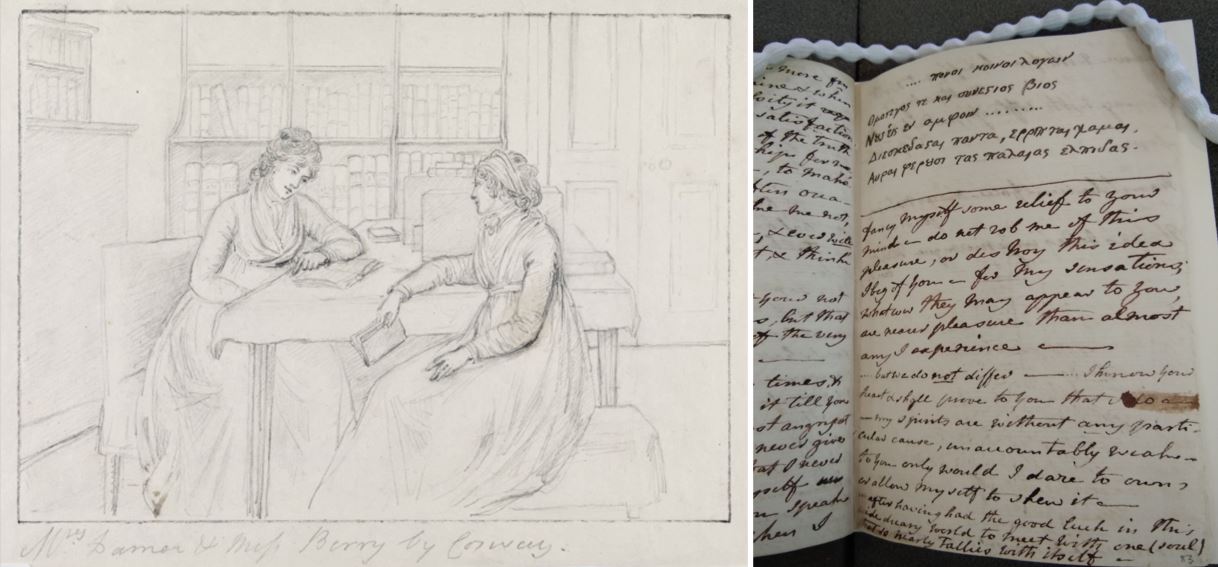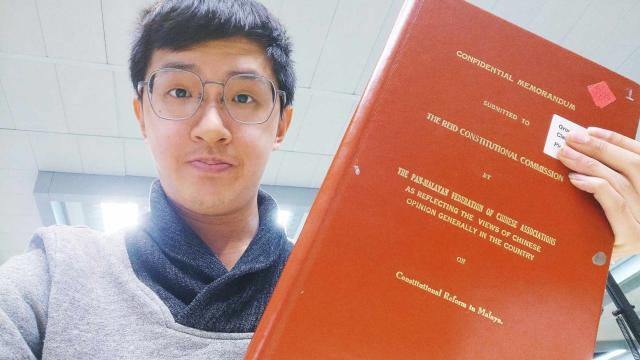
St Catharine’s Fellow Dr Caroline Gonda (1996) recently spoke at an online event about the significance of sculptor Anne Damer (1748/1749–1828) in queer history. The talk was hosted by Strawberry Hill House to mark LGBT+ History Month.
Dr Gonda’s research has recently focused on the private notebooks of Anne Damer in the collection of the Lewis Walpole Library:
“The Lewis Walpole Library in Farmington, Connecticut, contains four of Damer’s notebooks, which combine classical material and extracts from the loving letters she received from the writer Mary Berry (1763–1852), the last woman who was important in her life. After first looking at these notebooks several years ago, I was delighted to be able to return to the Library for a four-week residential fellowship in 2019. Since many of Damer’s private papers were destroyed by her or at her request, these surviving materials offer rare insights and it is important that she chose to keep such an affectionate record of her relationship with Berry.”
 Pictured (left to right): A sketch of Damer and Berry from the Lewis Walpole Library; a page from one of Damer’s notebooks with Greek followed by affectionate correspondence from Berry.
Pictured (left to right): A sketch of Damer and Berry from the Lewis Walpole Library; a page from one of Damer’s notebooks with Greek followed by affectionate correspondence from Berry.
The notebooks have been digitised, but Dr Gonda appreciated the opportunity to study the originals at the Lewis Walpole Library:
“It was a very powerful experience for me to be able to sit with the actual objects. Damer’s handwriting is difficult to read and sometimes it was only possible to make out a particular word by comparing the digital copy with the original notebooks. What’s more, I found other things in the library that I hadn’t expected; the most exciting of these was Berry’s notebook, containing her account of a dream that occurred 12 years after Damer’s death, where Berry imagines having a child who she would leave to Damer and a nebulous husband figure.”
For Dr Gonda, the notebooks are evidence of Damer’s significance in queer history by challenging our assumptions about women from that time, and offering a different model of queer identity to the one more commonly known and celebrated: Anne Lister (1791–1840), whose remarkably frank diaries chronicle her sexual and romantic relationships with numerous women.
“Damer is an older contemporary of Lister, and both women knew Mary Berry. Damer was repeatedly and publicly called a ‘Sapphist’ (what we might now call lesbian) and was described as ‘a lady much suspected for liking her own sex in a criminal way’, yet we have little in the way of insights into her private life and thoughts. Glimpses of a private identity are often difficult to recover, but studying her notebooks reveals how she uses quotations from Latin and Greek texts to push back against that public discourse and define an identity on her own terms.
“Sadly, Damer has not been taken seriously as a reader of classical literature, so I am the first to trace the significance (and in some cases the correct attribution) of the Latin and Greek material in her notebooks. Damer and Berry’s love of the Classics was an important facet of their relationship: they discussed their reading, exchanged books as gifts, and bought books to share. Damer’s lengthy quotation from Cicero’s de Amicitia, at the start of her first notebook, claims the high ground of classical friendship for herself and Mary Berry – an ideal of friendship that the eighteenth century assumed was exclusive to men.”
Dr Gonda is looking forward to sharing more details from this research in two upcoming articles and is also preparing a new edition of the notebooks for publication. Her talk was recorded and should appear soon on Strawberry Hill House’s YouTube channel. For members of the St Catharine’s community who are interested in Damer’s life, she recommends the novel Life Mask by Emma Donoghue – a “vivid and well researched” fictional account.




